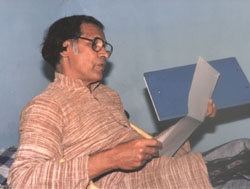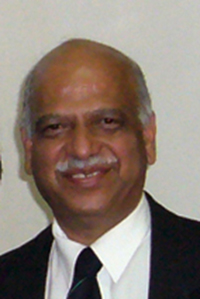The Indian Council of Social Science Research (ICSSR) is the national body overseeing research in the social sciences in India. It was established in New Delhi in 1969.

Balkrishna Vithaldas Doshi OAL was an Indian architect. He is an important figure in Indian architecture and noted for his contributions to the evolution of architectural discourse in India. Having worked under Le Corbusier and Louis Kahn, he was a pioneer of modernist and brutalist architecture in India.

Sebastian Kappen was an Indian Jesuit priest and liberation theologian.

CHRIST, also known as Christ College and Christ University, is a deemed-to-be-university located in Bengaluru, Karnataka, India. Founded in 1969 as Christ College, the UGC conferred autonomy to the college in 2004. On 22 July 2008, it was declared as an institution deemed to be university under section 3 of UGC Act 1956 by the Ministry of Education, Government of India.
The Unlawful Activities (Prevention) Act is an Indian law aimed at the prevention of unlawful activities associations in India. Its main objective was to make powers available for dealing with activities directed against the integrity and sovereignty of India. The most recent amendment of the law, the Unlawful Activities (Prevention) Amendment Act, 2019 has made it possible for the Union Government to designate individuals as terrorists without following any formal judicial process. UAPA is also known as the "Anti-terror law".
Jnana Deepa (JD), Institute for Philosophy and Theology is located at Pune, India. It is the academic component of Papal Seminary, Pontificium Athenaeum Kandiensis seu Pooniensis. Founded by the Pope Leo XIII with the motto “Filii tui India administri tibi salutis” in Kandy in 1893, it was transferred to Pune (India) in 1955. Catering primarily to the formation of diocesan priests but open to Catholic faithful and other religious orders, especially candidates to the Catholic priesthood it is entrusted by the Holy See to the Society of Jesus for training future Catholic leaders.

Education and Research Network (ERNET) is an autonomous scientific society of the Ministry of Electronics and Information Technology, Government of India. ERNET has made a significant contribution to the emergence of networking in the country. It practically brought the Internet to India and has built up national capabilities in the area of net-working, especially in protocol software engineering. It is the first internet service in india. It has not only succeeded in building a large network that provides various facilities to the intellectual segment of Indian society—the research and education community, it has over the years become a trendsetter in the field of networking.

Shridhar Ramachandra Gadre is an Indian scientist working in computational quantum and theoretical chemistry.

Richard De Smet was a Belgian Jesuit priest, and missionary in India. As Indologist he became a renowned Sankara specialist.
Libraries and Information Centres in India

The Indian Social Institute (ISI), founded in 1951 in Pune (India), is a Jesuit centre for research, training, and action for socio-economic development and human rights in India. Founded by Jerome D'Souza, in Pune, it was shifted to New Delhi in 1963 where it is located at the Lodi Institutional Area.

Shekhar C. Mande is Structural and Computational Biologist. He was the Director General of the Council of Scientific and Industrial Research (CSIR), India, and the Secretary of the Department of Scientific and Industrial Research (DSIR), Ministry of Science and Technology. Prior to this, he was the Director of National Centre for Cell Science, Pune.
Dr. Kodaganur S. Gopinath, MS, FAMS, FRCS (Edin) is an Indian surgical oncologist, known for his pioneering work on oncological research. He is a recipient of many awards including Dr. B. C. Roy Award, considered to be the premier medical honour in the country. The President of India recognised his services to the field of oncology, by awarding him the fourth highest civilian award, Padma Shri, in 2010.
Arcot Ramachandran (1923-2018) was an Indian scientist, anthropologist, author and a former Under-Secretary General of United Nations Centre for Human Settlements, known for his scholarship on the subjects of heat and mass transfer and environment and his social commitment to the cause of sustainable development. The Government of India honoured him in 2003, with the Padma Bhushan, the third highest civilian award, for his services to the fields of Science and Engineering.
Shadakshari Settar was an Indian professor and scholar who had conducted research in the fields of Indian archaeology, art-history, history of religions and philosophy as well as classical literature.
Upendra Kaul is an Indian cardiologist and one of the pioneers of interventional cardiology in India. He is the Chairman and Dean Academics and Research at the Batra Hospital and Medical Research Center. He is known for his expertise in procedures such as Percutaneous Cardiopulmonary bypass, Rotational and Directional Atherectomy, Coronary stenting and Percutaneous Laser Myocardial Revascularization. He graduated in medicine (MBBS) from the Maulana Azad Medical College and continued his studies at the same institution to secure MD in 1975 and, DM in cardiology in 1978. Later, he obtained advanced training in interventional cardiology from Australia during 1983 to 84. He has served the All India Institute of Medical Sciences (AIIMS) as a professor of cardiology and has been a member of the faculty of the Post Graduate Institute of Medical Education and Research, G. B. Pant Hospital, Batra Hospital and Fortis Health Care, NCR. and Executive Director and Dean at Fortis Health Care, New Delhi.

Tejaswini Niranjana is an Indian professor, cultural theorist, translator and author. She is best known for her contribution to the fields of culture studies, gender studies, translation, and ethnomusicology. She is the daughter of Kannada playwright and novelist Niranjana and writer Anupama Niranjana. Her partner is Indian author and cultural theorist, Ashish Rajadhyaksha.
The 2018 battle of Bhima Koregaon refers to violence during an annual celebratory gathering on 1 January 2018 at Bhima Koregaon to mark the 200th anniversary of the Battle of Bhima Koregaon. The violence and stone pelting by a crowd at the gathering resulted in the death of a 28-year old youth and injuries to five others. The annual celebration, also called Elgar Parishad convention, was organised by retired justices B. G. Kolse Patil and P. B. Sawant. Justice Sawant stated that the term "Elgar" meant loud invitation or loud declaration.

Stanislaus Lourduswamy, SJ, popularly known as Stan Swamy, was an Indian Catholic priest, a member of the Jesuit order, and a tribal rights activist for several decades. Swamy was the oldest person to be accused of terrorism in India.










